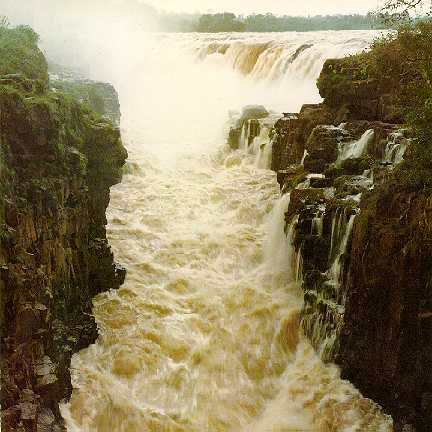Most Amazing Places On The World 1
Guaíra Falls
Brazil-Paraguay

Located on the Parana river the Guaíra Falls were, in terms of total volume, the largest waterfall on earth.
1,750,000 cubic feet of water fell over this waterfall each second on average, compared to just 70,000 cubic feet per second for
Niagra Falls.
However, the falls were flooded in 1982 when a dam was created to take advantage of this
massive flow rate.
The Itaipu Dam is now the second most powerful
hydroelectric dam in the world, after
the Three Gorges Dam.
The Itaipu
Dam supplies 90% of the power consumed by Paraguay, and 19% of the power consumed by Brazil, including Rio de Janeiro and São Paulo.
Iceberg B-15
antartica
Iceberg B-15 was the largest ever
recorded iceberg.
It had an area of 3,100 km², making it larger than the island of Jamaica, and was created
when part of the Ross Ice Shelf broke
off in March 2000.
In 2003, it broke apart, and one of the larger pieces (called B-15a) drifted north, eventually
smashing into a glacier in 2005, breaking off an 8-km² section and forcing many antarctic maps to be rewritten.
It drifted along the coast and eventually ran aground, breaking up once again.
In 2006, a storm in Alaska
(that’s right, Alaska) caused an ocean
swell that travelled 13,500km, over 6
days, to Antarctica and broke up the
largest remaining part even more.
Almost a decade on, parts of the iceberg have still not melted, with the
largest remaining part, still called B-15a, having an area of 1,700 km².
The picture above shows B-15a (top left) in 2005, after drifting west into the
Drygalski Glacier (bottom), breaking the
end off into several pieces.
Don Juan Pond
Antarctica
With a salinity of over 40%, Don Juan Pond is
the saltiest body of water in the world.
It is named after the two pilots who first investigated the pond in 1961, Lt Don Roe and Lt John Hickey.
It is a small lake, only 100m by 300m, and on average 0.1m deep, but it is so
salty that even in the Antarctic, where the temperature at the pond regularly drops to as low as -30 degrees Celsius, it never freezes.
It is 18 times saltier than sea water, compared to
the Dead Sea which is only 8 times saltier than sea water.
Rotorua
New Zealand
Rotorua is a city on the southern shores of the
lake of the same name, in the Bay of Plenty region of the North Island of New Zealand.
The city is known for its geothermal activity, with a number of
geysers, notably the Pohutu Geyser
at Whakarewarewa, and boiling mud pools (pictured above) located in the city.
This thermal activity owes itself to the Rotorua caldera on which the city lies.
Rotorua is also a top adventure destination and is New Zealand’s Maori cultural heartland.
Rotorua city is renowned for its unique “rotten eggs” aroma, which is caused by the geothermal activity releasing sulphur compounds into the atmosphere.
If you are ever visiting New Zealand – this is a city you must see.
It was once home to the famed Pink and White Terraces and you can visit thermal wonderlands with sights that are truly
astounding.
Socotra
Republic of Yemen 
Socotra has been described as one
of the most alien-looking place on
Earth, and it’s not hard to see why.
It is very isolated with a harsh, dry
climate and as a result a third of its
plant-life is found nowhere else,
including the famous Dragon’s
Blood Tree, a very-unnatural
looking umbrella-shaped tree which
produces red sap.
There are also a large number of birds, spiders and other animals native to the island,
and coral reefs around it which
similarly have a large number of
endemic (i.e. only found there)
species.
Socotra is considered the most biodiverse place in the Arabian sea, and is a World Heritage Site.
UNDER MAINTENANCE